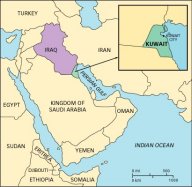


Page 2 of 4
On 2nd August 1990, Saddam Hussein executed the type of blitzkrieg attack he had used against Iran, on that occasion with such disastrous consequences. This time, however, the victim was of a more appropriate size.
Within a few hours, Saddam’s forces were in control of Kuwait. The United Nations Security Council immediately passed Resolution 660, which condemned the Iraqi action and called on the Iraqi forces to withdraw forthwith, threatening sanctions and possible military action if Iraq failed to comply. Following the collapse of communism in the Soviet Union, the United Nations Security Council was able to act quickly and decisively on this occasion, with the United States and the Soviet Union in agreement.
Saudi Arabia immediately sent troops to its border with Kuwait and endorsed, in Cairo, the Arab League resolution condemning Iraq. The resolution was approved by the majority of members but was opposed by Jordan, Mauritania, Sudan, Yemen, the Palestine Liberation Organization and, of course, Iraq. When the Arab League Heads of State met in Cairo on 10th August, twelve of the twenty member countries present voted to contribute to the multinational force that was assembling to liberate Kuwait; eight demurred.
It was already clear that a majority of Arab States condemned Iraq’s blatant act of aggression. Just as Saddam Hussein’s initiation of the Iraq–Iran war had diverted attention away from the problem of Israel, so his action now drew Western powers into Arab affairs.

